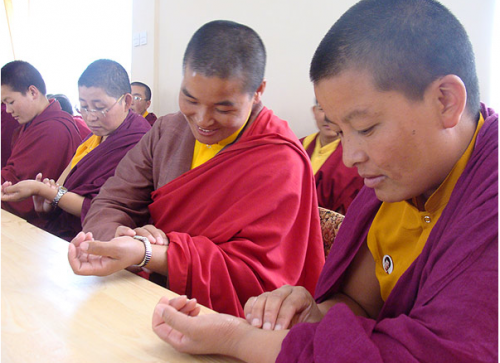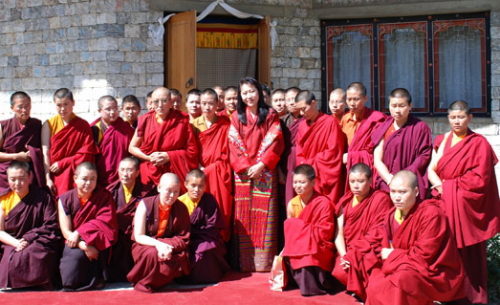One way to give compassionately and intelligently this holiday season is to widen the net of those who receive the benefit of your generosity by donating to charities and nonprofit organizations. You can forego traditional presents and instead make a donation in your loved one’s name, or you can pledge to donate the amount of money you spend on holiday gifts this year to a worthy cause. Every Tuesday here on Tricycle’s Buddhist Holiday Survival Guide, we’ll be posting about Buddhist organizations who could use your help this holiday season.
Bringing Bhutan’s Nuns Forward: Bhutan Nuns Foundation

It was 2009, and Tashi Zangmo, back in her homeland of Bhutan, had transformed herself from a PhD student into the one-woman ship of the Bhutan Nuns Foundation, an organization committed to improving the living conditions, education, and self-reliance of Bhutan’s nuns. Struck with the inspiration of starting the foundation while in the United States writing her doctoral thesis, Zangmo had finished writing, graduated, and flown back to the Himalayan enclave a woman with a mission.
“In Bhutan, nuns are the group of citizens who need attention,” said Zangmo. “Nobody has written about them, nobody has talked about them. They have no support from the government, or from anywhere.” Often, they live in shacks without running water, electricity, and proper kitchens, bedrooms, or bathrooms.
These women, though looked up to as role models in their local communities, have been sorely underrepresented and overlooked since the start of the Bhutanese nation. Though Shabdrung Ngawang Namgyal, the country’s founder, set up monastic schooling for men, the possibility of Buddhist studies for women was forgotten, explained Zangmo, and “the nunneries got left behind.”
Zangmo is determined to bring them forward. Though supplied with moral support from the organization’s patron, Bhutan’s Queen Mother Ashi Tshering Yangdon Wangchuck, and monetary support from her own fundraising as well as from Bhutan’s current prime minister, Zangmo began the first year of the Bhutan Nuns Foundation alone, figuring out the basics: who, where, and how to help.
There are 26 nunneries in Bhutan, and about half of them are small and located in remote rural areas, far away from the thriving cities of Thimphu and Paro and sometimes a day’s walk from any major roads or health centers. It is these nunneries especially that are in need. Whereas the larger, city nunneries are often under patronage of a founding teacher, the country nunneries lack qualified teachers and a curriculum as well as basic teaching materials: a classroom, for one thing, but also books, pencils, and a blackboard.
For these nunneries, Zangmo focuses on the basics, raising money to build infrastructure like bathrooms and showers. After that has been taken care of, she can then provide various educational classes—in health and hygiene, first aid, sanitation, and nutrition—that some of the larger nunneries, already equipped with safe living spaces, are offered immediately.
“We can talk all we want in our trainings about health and sanitation,” Zangmo said. “But if they don’t even have a bathroom—if they’re going into the woods to go to the bathroom—then how can they be healthy and clean?”
It’s a challenge to be sure, made even more challenging by the fact that neither the nuns nor the Bhutan Nuns Foundation can afford to hire builders. Though a construction consultant is provided by the organization, the nuns build everything themselves, using mud and bricks to pound together walls.

Beyond helping with infrastructure, the Bhutan Nuns Foundation has developed a training curriculum that encourages nuns to become social workers, teachers, doctors, and counselors, so that they can advocate both for themselves and for their communities—and especially for women.
“Women and young girls trust the nuns more than anybody else,” Zangmo explained. With that trust and the appropriate training, nuns can counsel troubled youths, but most importantly, they can provide medical aid or accompany the seriously sick to doctors or hospitals.
One such nun is Ani Rinzin, who after attending many of the Bhutan Nuns Foundation’s classes, decided that she would seek admission to a five-year course in traditional Bhutanese medicine. The Bhutan Nuns Foundation is assisting her in putting together an application and will pay for her tuition upon acceptance.
“If I can get the training,” she said, “I can help my nunnery, and build a community around it.”
—Emma Varvaloucas, Associate Editor
Make a donation here: www.bhutannuns.org